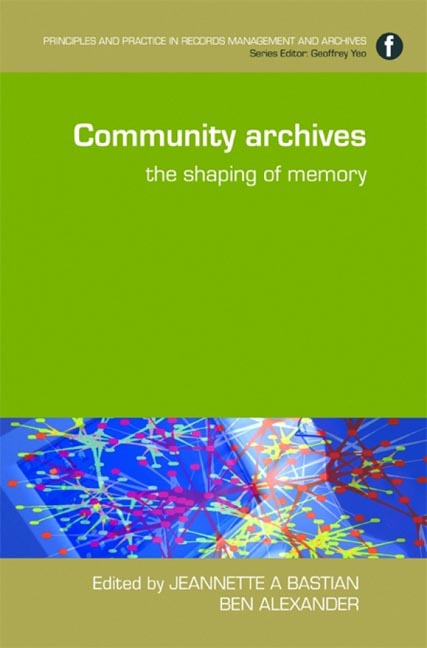Book contents
- Frontmatter
- Contents
- Introduction to the series
- Acknowledgements
- Contributors
- Introduction: Communities and archives – a symbiotic relationship
- Part 1 A community archives model
- Part 2 Communities and non-traditional record keeping
- Part 3 Records loss, destruction and recovery
- 6 Archiving the queer and queering the archives: a case study of the Canadian Lesbian and Gay Archives (CLGA)
- 7 A living archive, shared by communities of records
- 8 Truth commissions and the construction of collective memory: the Chile experience
- Part 4 Online communities: how technology brings communities and their records together
- Part 5 Building a community archive
- Conclusion: The archivist and community
- Bibliography
- Index
- Miscellaneous Endmatter
- Miscellaneous Endmatter
- Miscellaneous Endmatter
7 - A living archive, shared by communities of records
from Part 3 - Records loss, destruction and recovery
Published online by Cambridge University Press: 08 June 2018
- Frontmatter
- Contents
- Introduction to the series
- Acknowledgements
- Contributors
- Introduction: Communities and archives – a symbiotic relationship
- Part 1 A community archives model
- Part 2 Communities and non-traditional record keeping
- Part 3 Records loss, destruction and recovery
- 6 Archiving the queer and queering the archives: a case study of the Canadian Lesbian and Gay Archives (CLGA)
- 7 A living archive, shared by communities of records
- 8 Truth commissions and the construction of collective memory: the Chile experience
- Part 4 Online communities: how technology brings communities and their records together
- Part 5 Building a community archive
- Conclusion: The archivist and community
- Bibliography
- Index
- Miscellaneous Endmatter
- Miscellaneous Endmatter
- Miscellaneous Endmatter
Summary
Introduction
In 1993 the United Nations Security Council (UNSC) established the International Criminal Tribunal for the Prosecution of Persons Responsible for Serious Violations of International Humanitarian Law Committed in the Territory of the Former Yugoslavia since 1991 (ICTY) ‘for the sole purpose of prosecuting persons responsible for serious violations of international humanitarian law committed in the territory of the former Yugoslavia’ (UNSC, 1993; Bassiouni and Manikas, 1996; Scharf, 1997; Bass, 2000). The central purpose of the ICTY, as of any criminal court, is the deterrence of, and retribution for, serious wrongdoing (Osiel, 1997). But from the start, expectations of what the Tribunal could achieve went beyond the primary judicial goal of establishing the truth about and giving an historical record of what happened, contributing to healing individuals’ and communities’ traumas, and to reconciliation (Power, 2002). Connected with the diverse expectations of the outcomes of the Tribunal's work are expectations of the role the Tribunal's archives can play. Expectations are mounting as the ICTY's work is near completion and decisions about the legacy of the Tribunal are imminent.
In this essay, I explore the potential of the ICTY archives in establishing truth, engaging with history and practising memory – all of which may help communities in former Yugoslavia and elsewhere not only come to grips with their own past but also acknowledge a past shared with neighbouring ethnic and political communities. I will argue that these expectations can only be met by a living archive as a place of contestation, allowing for what Hayden White has called different kinds of discourse about ‘what happened and what is to be done’ – the archive not merely as a storage technique but primarily as a force for delegitimation of mythified and traditionalized memories (White, 2000, 55).
‘Sarajevo joins race for ICTY archive’ (Dnevni avaz, 2007)
‘Discussion on the fate of ICTY archive’ (Nezavisne novine, 2007)
‘Fighting for the Hague documents’ (Nedeljni Telegraf, 2008)
‘BiH, Serbia, Croatia all lobby to take over ICTY archives’ (Vecernji list, 2008)
With headlines like these, the media in Bosnia and Herzegovina, Republika Srpska, Serbia and Croatia brought the archives of the ICTY into the limelight. The headlines also attest to contesting views on the fate of the archives, which vary by region in the former Yugoslavia. And even within one region there are competing views.
- Type
- Chapter
- Information
- Community ArchivesThe shaping of memory, pp. 109 - 132Publisher: FacetPrint publication year: 2009
- 12
- Cited by

